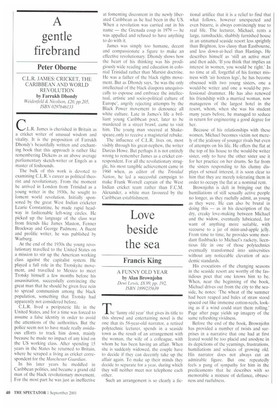A gentle firebrand
Peter Oborne
C.L.R. JAMES: CRICKET, THE CARIBBEAN AND WORLD REVOLUTION by Farrukh Dhondy Weidenfeld & Nicolson, £20, pp.205, ISBN 0297646133 C.L.R. James is cherished in Britain as a cricket writer of unusual wisdom and vitality. It is the proposition of Farrukh Dhondy's beautifully written and enchanting book that this approach is rather like remembering Dickens as an above average parliamentary sketch-writer or Engels as a master of foxhounds.
The bulk of this work is devoted to examining C.L.R.'s career as political theorist and revolutionary. From the moment he arrived in London from Trinidad as a young writer in the 1930s, he sought to foment world revolution. Initially sponsored by the great West Indian cricketer Learie Constantine, he made rapid headway in fashionable left-wing circles. He picked up the language of the class war from friends like James Maxton, Fenner Brockway and George Padmore. A fluent and prolific writer, he was published by Warburg.
At the end of the 1930s the young revolutionary travelled to the United States on a mission to stir up the American working class against the capitalist system. He played a full role in the Trotskyite movement, and travelled to Mexico to meet Trotsky himself a few months before his assassination, successfully convincing the great man that he should be given free rein to spread communism among the black population, something that Trotsky had apparently not considered before.
C.L.R. lived a peripatetic life in the United States, and for a time was forced to assume a false identity in order to avoid the attentions of the authorities. But the police seem not to have made really assiduous efforts to track him down, mainly because he made no impact of any kind on the US working class. After spending 15 years in the States he returned to Britain. where he scraped a living as cricket correspondent for the Manchester Guardian.
In his later years he meddled in Caribbean politics, and became a grand old man of the black revolutionary movement. For the most part he was just as ineffective at fomenting discontent in the newly liberated Caribbean as he had been in the US. When a revolution was carried out in his name — the Grenada coup in 1979 — he was appalled and refused to have anything to do with it.
James was simply too humane, decent and compassionate a figure to make an effective revolutionary. Dhondy shows how the heart of his thinking was his prodigiously wide reading and education in colonial Trinidad rather than Marxist doctrine. He was a father of the black rights movement. But as Dhondy says, 'he was the only intellectual of the black diaspora unequivocally to espouse and embrace the intellectual, artistic and socio-political culture of Europe', angrily rejecting attempts by the Black Power movement to denounce all white culture. Late in James's life a brilliant young Caribbean poet, later to be murdered in a street brawl, came to visit him. The young man sneered at Shakespeare,only to receive a magisterial rebuke.
The influence of C.L.R. lives on, most visibly through his great-nephew, the writer Darcus Howe. But perhaps it is not entirely wrong to remember James as a cricket correspondent. For all the revolutionary struggle, his most tangible achievement came in 1960 when, as editor of the Trinidad Nation, he led a successful campaign to make Frank Worrell captain of the West Indian cricket team rather than F.C.M. Alexander. a white man favoured by the Caribbean establishment.


























































 Previous page
Previous page